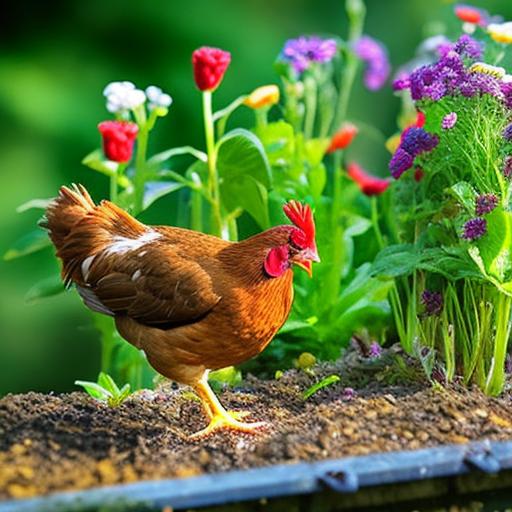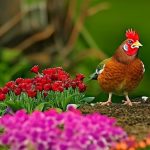Keeping chickens in a small garden can be a wonderful addition to your backyard. Not only do they provide fresh eggs and fertilizer, but they also make entertaining and low-maintenance pets. In this blog post, we will cover everything you need to know about keeping chickens in a small garden.
Key Takeaways
- Keeping chickens in a small garden can provide fresh eggs and fertilizer.
- Selecting the right breeds is important for a small garden.
- Understanding local regulations and zoning laws is crucial before keeping chickens.
- Preparing the garden and building a coop and run are necessary steps.
- Maintaining cleanliness, managing noise and odor, and keeping chickens safe from predators are important for successful chicken keeping in a small garden.
Selecting the Right Breeds for a Small Garden
When it comes to keeping chickens in a small garden, not all breeds are suitable. Some breeds require more space and are better suited for larger areas. When selecting chickens for your small garden, it’s important to choose breeds that are known for their ability to thrive in confined spaces.
Bantam chickens are a popular choice for small gardens. They are smaller in size compared to standard breeds, which means they require less space. Bantams are also known for their friendly and docile nature, making them great pets for families with children.
Another breed that is well-suited for small gardens is the Sussex chicken. They are known for being calm and friendly, making them easy to handle and interact with. Sussex chickens also have a good egg-laying capacity, so you can enjoy fresh eggs from your garden.
Understanding Local Regulations and Zoning Laws
Before getting chickens for your small garden, it’s important to understand the local regulations and zoning laws in your area. Some cities have restrictions on keeping chickens, while others may require permits or have specific guidelines that need to be followed.
To ensure that you comply with the regulations, it’s important to do your research. Check with your local government or zoning department to find out what the rules are for keeping chickens in your area. You may also want to talk to your neighbors and get their input before bringing chickens into your garden.
Preparing Your Garden for Chickens
Chickens can be destructive to gardens if not properly contained. They have a natural instinct to scratch and peck at the ground, which can damage plants and flowers. To protect your garden, it’s important to prepare it before bringing in chickens.
One way to protect your garden is by creating a designated area for your chickens to roam. This can be done by installing a chicken run or using chicken wire to create a fenced-off area. By providing them with their own space, you can prevent them from wandering into your garden and causing damage.
You can also protect your plants by using raised beds or containers. This will elevate your plants off the ground and make it more difficult for chickens to access them. Additionally, consider planting chicken-friendly plants such as herbs and vegetables that they can safely peck at without causing harm.
Building a Coop and Run for Your Chickens
A coop and run are essential for keeping chickens safe and healthy in a small garden. The coop provides shelter for your chickens, while the run gives them space to exercise and explore. When building a coop and run for your small garden, there are a few things to consider.
First, make sure that the coop is well-ventilated and provides enough space for your chickens to move around comfortably. It should also have nesting boxes where they can lay their eggs and roosting bars where they can sleep at night.
The run should be secure and predator-proof. Use sturdy materials such as hardware cloth or welded wire mesh to prevent predators from getting in. It’s also important to provide shade and protection from the elements, so consider adding a roof or covering to the run.
Providing Adequate Food and Water

Chickens need a balanced diet to stay healthy and lay eggs. In a small garden, it’s important to provide them with adequate food and water.
A good quality chicken feed is essential for meeting their nutritional needs. Look for feeds that are specifically formulated for laying hens, as these will have the right balance of protein, vitamins, and minerals. You can also supplement their diet with kitchen scraps and garden greens, but make sure to avoid feeding them anything toxic or harmful.
Water is also important for chickens, especially during hot weather. Make sure they have access to clean and fresh water at all times. Consider using a waterer that is designed to prevent spillage and contamination.
Maintaining Cleanliness and Hygiene
Keeping a clean coop and run is important for the health of your chickens and your garden. Regular cleaning and maintenance can help prevent the spread of diseases and parasites.
Clean out the coop on a regular basis, removing any soiled bedding and replacing it with fresh material. Scrub the surfaces with a mild detergent or disinfectant to kill any bacteria or parasites. It’s also important to regularly clean the waterers and feeders to prevent contamination.
In addition to cleaning, it’s important to practice good hygiene when handling chickens. Wash your hands thoroughly after handling them or their eggs to prevent the spread of bacteria.
Managing Noise and Odor in a Small Garden
Chickens can be noisy, especially when they are laying eggs or feeling threatened. In a small garden, it’s important to manage noise levels to keep your neighbors happy.
One way to reduce noise is by selecting quieter breeds. Bantam chickens are generally quieter compared to larger breeds. You can also provide them with distractions such as toys or treats to keep them occupied and reduce boredom.
Odor can also be a concern in a small garden. To manage odor, make sure to regularly clean the coop and run. Use absorbent materials such as straw or wood shavings in the coop to help control odor. Additionally, consider composting chicken manure to turn it into fertilizer for your garden.
Keeping Your Chickens Safe from Predators
Predators can be a threat to chickens in a small garden, so it’s important to take steps to keep them safe. Common predators include raccoons, foxes, and neighborhood cats.
To protect your chickens, make sure that the coop and run are secure and predator-proof. Use sturdy materials and bury wire mesh around the perimeter to prevent predators from digging under. Consider installing motion-activated lights or alarms to deter nocturnal predators.
It’s also important to provide your chickens with a safe place to retreat. This can be a covered area or a small shelter within the run where they can hide if they feel threatened.
Enjoying the Rewards of Fresh Eggs and Fertilizer in Your Small Garden
Keeping chickens in a small garden can be a rewarding experience. Not only do they provide fresh eggs, but they also produce high-quality fertilizer for your garden.
Fresh eggs from your own chickens are not only delicious but also nutritious. They are higher in omega-3 fatty acids and vitamins compared to store-bought eggs. Plus, you have the satisfaction of knowing exactly where your food comes from.
Chicken manure is also a valuable source of fertilizer for your garden. It is rich in nitrogen, phosphorus, and potassium, which are essential nutrients for plant growth. You can compost the manure and use it to fertilize your plants, helping them thrive and produce abundant harvests.
In conclusion, keeping chickens in a small garden can be a fun and rewarding experience. By selecting the right breeds, understanding local regulations, preparing your garden, building a coop and run, providing adequate food and water, maintaining cleanliness and hygiene, managing noise and odor, keeping your chickens safe from predators, and enjoying the rewards of fresh eggs and fertilizer, you can ensure that your chickens are happy and healthy while also benefiting from their presence in your garden.
If you’re wondering how to keep chickens in a small garden, you’ll definitely want to check out this informative article on Poultry Wizard. They have a great resource on designing the floor of your chicken coop, which is essential for creating a comfortable and hygienic environment for your feathered friends. You can find the article here: https://poultrywizard.com/keeping-chickens/floor-of-chicken-coop/. Additionally, if you’re looking for some inspiration on building a chicken coop and run in a limited space, Poultry Wizard also offers helpful plans that you can explore here: https://poultrywizard.com/keeping-chickens/chicken-coop-run-plans/. And if you’re dreaming of a charming farmhouse-style chicken coop that fits perfectly in your small garden, don’t miss their article on farmhouse chicken coop designs: https://poultrywizard.com/keeping-chickens/farmhouse-chicken-coop/. Happy chicken keeping!
FAQs
What is the minimum space requirement for keeping chickens in a small garden?
Chickens require at least 2-3 square feet of space per bird in their coop and 8-10 square feet of outdoor space per bird to roam around.
What type of coop is suitable for a small garden?
A small garden can accommodate a coop that is around 4-6 feet wide and 6-8 feet long. A coop with a run attached is ideal for a small garden.
What kind of chickens are suitable for a small garden?
Bantam breeds or smaller breeds like Silkies, Polish, or Seramas are suitable for a small garden as they require less space and are quieter than larger breeds.
What should be the diet of chickens in a small garden?
Chickens require a balanced diet of grains, protein, and calcium. They can be fed with commercial chicken feed, kitchen scraps, and occasional treats like fruits and vegetables.
What are the legal requirements for keeping chickens in a small garden?
The legal requirements for keeping chickens in a small garden vary depending on the location. It is important to check with the local authorities for any zoning laws or regulations regarding backyard chickens.
What are the benefits of keeping chickens in a small garden?
Keeping chickens in a small garden can provide fresh eggs, natural pest control, and fertilizer for the garden. It can also be a fun and educational experience for children and adults alike.
Meet Walter, the feathered-friend fanatic of Florida! Nestled in the sunshine state, Walter struts through life with his feathered companions, clucking his way to happiness. With a coop that’s fancier than a five-star hotel, he’s the Don Juan of the chicken world. When he’s not teaching his hens to do the cha-cha, you’ll find him in a heated debate with his prized rooster, Sir Clucks-a-Lot. Walter’s poultry passion is no yolk; he’s the sunny-side-up guy you never knew you needed in your flock of friends!







